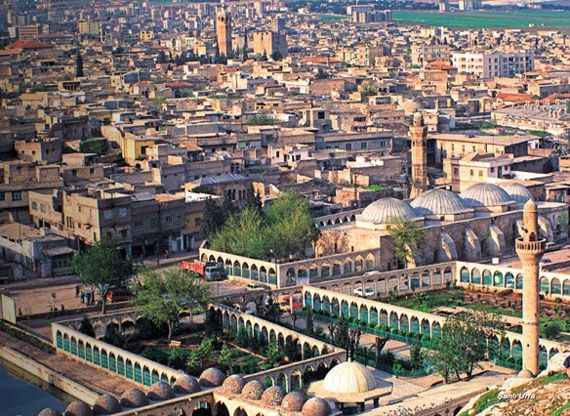
Photo Courtesy of Turkey Official Tourism
You can take that title literally. I looked out of the window of my hotel room and there it was: the land of my dreams, the Sea of Mesopotamia, as they call it, stretching out endlessly, all the way to Syria and beyond.
 A view I was hard pressed to take my eyes away from, thinking about the countless civilizations which have passed through, the Babylonian astronomers gazing at the same sky I was, making their charts and calculations. I remembered that one of the first history books I ever read was about Mesopotamia and finally at the ripe old age of 64, I have arrived to see for myself.
A view I was hard pressed to take my eyes away from, thinking about the countless civilizations which have passed through, the Babylonian astronomers gazing at the same sky I was, making their charts and calculations. I remembered that one of the first history books I ever read was about Mesopotamia and finally at the ripe old age of 64, I have arrived to see for myself.
The window in question belonged to the hotel where I stayed for three nights. Yet again, I have been incredibly lucky. The Zinciriye Hotel is a boutique hotel in the best sense of the word. Turkey is dominated by mountains and many towns are built up steep mountain sides.
 Mardin is no exception and the hotel,
Mardin is no exception and the hotel,located in the old part of town, perches right on top, just below a mosque and the ancient city walls, extending over four levels connected by stone steps, terraces and halls. We all know that brochures are often deceptive, but in this case I can honestly say that reality even surpassed the pictures. I was given a corner room with the best possible view over Mesopotamia and the rest of the town below, big bathroom with all amenities, free (working) wifi and breakfast included, all for 50 EUROS per night.

What’s more though is the fact that the hotel is a Medieval madrasa. Which means ‘a place of study’, in other words, a school where students were instructed in Islamic sciences and the Koran. The Zinciriye as well as many other buildings in Mardin dating from the same period is a marvelous example of the art of stone carvings for which the region is famous. Next to Islam, Christianity has deep roots in the region, that’s why you will find the beautiful Ulu Mosque right next to the Forty Martyrs’ Church and, 9km outside Mardin the famous Deyrulzafaran monastery about which I will write in another post.
 Mardin is the ideal starting point to get a feeling and overview of a very different Turkey as well as undertaking day trips to the surrounding towns, sites and monuments. A few (stone) steps down from the hotel entrance leads right into the narrow streets of the medieval market dominated by the workshops of silversmiths and soap manufacturers.
Mardin is the ideal starting point to get a feeling and overview of a very different Turkey as well as undertaking day trips to the surrounding towns, sites and monuments. A few (stone) steps down from the hotel entrance leads right into the narrow streets of the medieval market dominated by the workshops of silversmiths and soap manufacturers.
Not to forget countless small restaurants where I couldn’t resist sampling the Mardin Kebab, a particularly spicy and tasty kebab made from minced lamb. The population is predominantly Kurdish, with Turks and Syriacs mixed in. Which leads us to the language. What is spoken is Kurdish, Turkish and Arabic…and not much else. Even the nice receptionist in the hotel only had very basic English, so before you go, practice your sign language and have your Turkish phrase book at the ready and you will be fine.
 Mardin and the entire region has definitely a Middle East feeling about it. The houses in the villages are adobe, sheep abound, nobody is in a hurry, tea dominates all day long and at night you hear music from every roof top. Local musicians perform al fresco in many roof top restaurants, so you can either go and join or just open your window and enjoy the melodies.
Mardin and the entire region has definitely a Middle East feeling about it. The houses in the villages are adobe, sheep abound, nobody is in a hurry, tea dominates all day long and at night you hear music from every roof top. Local musicians perform al fresco in many roof top restaurants, so you can either go and join or just open your window and enjoy the melodies.
Mardin has been under Hittite, Babylonian, Persian, Roman and Selcuk rule and the Sabanci Mardin City Museum is a treasure trove of artifacts from each period.
Who needs an expensive spa if they can have Mardin? The juxtaposition of the mountains and the vast stretch of Mesopotamia is balm for the soul, just make sure you are in good shape to climb stone steps up and down all day long, leave the heels at home and enjoy.
This post originally appeared at CityRoom.com.









